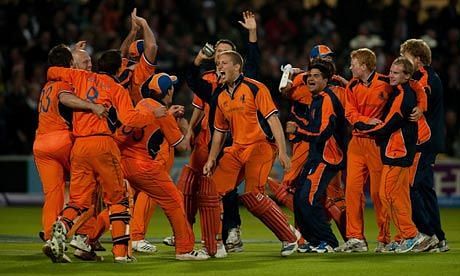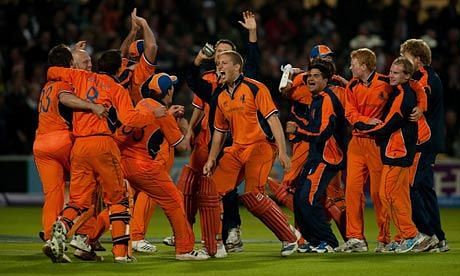
Men in orange on red alert: Dutch set sights on cricket World Cup

The Hague, Mar 1 (AFP) On a fine summer's day more than a century ago, a local and British sports team bowled what is widely believed to be one of the first-ever "international" overs in a cricket game in the Netherlands.
Today, 136 years after the Dutch team lost by an innings and 56 runs against Uxbridge Cricket Club, the men in orange are setting their sights on competing in cricket's ultimate tournament -- next year's World Cup in England.
The plucky Dutch are in Zimbabwe for the World Cup qualifying event starting Sunday -- which will give two teams who did not automatically make it like cricket giants Australia, India and South Africa, the chance to compete in the 2019 showpiece.
"There is a lot on the line in the short-term," admitted Dutch coach Ryan Campbell, a former Australian national player who took over the reins of the Dutch national squad in April last year.
Observers in the Netherlands agree, saying that under Campbell's careful eye, working with the Royal Dutch Cricket Federation's (KNCB) high performance manager Roland Lefebvre, the national team has made impressive strides in less than a year.
- 'Under pressure' -
====================
But the game of leather on willow has always seen its ebbs and flows in the low-lying Netherlands and the country's cricketing highs -- although the stuff of legends -- can be counted on one hand.
And while Dutch cricket is again hoping to rise in the international arena, there are worrying signs for the sport at home.
"I won't deny that cricket is under pressure in the Netherlands," said top KNCB official Alex de la Mar.
"This is perhaps mainly because we have to compete more-and-more with football," he told AFP.
Many cricket clubs share their fields with their football counterparts and recent measures have seen soccer being extended into summer, eating up much of the already desperately short cricket season.
In the football-mad Netherlands youngsters who show talent in both sports "are often forced to make a choice at a very young age as sports are not played in schools but at clubs," said former Dutch national player and international cricket coach Tim de Leede.
"Unfortunately many of them choose football," said De Leede, regarded as one of the country's greatest all-rounders and the Netherlands' top World Cup wicket taker.
- Game of numbers -
===================
The numbers tell a simple story: the KNCB counts some 5,500 members, the Royal Dutch Football Federation (KNVB), over 1,2 million from a population of 17 million people.
Fewer players mean less money, also internationally.
While main cricket-playing countries like India, England and other Test nations get the lion's share of funding, the Netherlands and other International Cricket Council associate members get far less to see their teams play.
"It's very simple... it's money. I hate to say it but money changes everything," national coach Campbell told AFP.
"You need cash for us to play more, to improve facilities and get the support of players if you wish to compete constantly on the world stage," he said.
It is then not without irony that the Dutch national team -- which will now also compete as the 13th country in the 2020-22 ODI League against the world's top teams -- still doesn't have a main sponsor.
- Spirit of cricket -
=====================
Nowhere is the battle for Dutch cricket more visible than at the V.O.C. training hall just outside the western port city of Rotterdam.
Being the country's only full-time dedicated indoor training facility, it's not uncommon to find a Dutch youth training session followed immediately by the national squad.
Because of limited training times and bad Dutch weather, indoor sessions often run until late at night and take place irrespective of rain or even snow.
Some believe that it perhaps best embodies the spirit of Dutch cricket -- a small tight-knit community where young players have easy access to the expertise of nationals like Dutch captain Peter Borren and former greats like Tom de Grooth.
The country's selectors are now looking at these young and upcoming talent to carry the torch, said Campbell.
De Leede's 18-year-old son Bas recently got his call-up, while the triplet sons of Pakistan-born Dutch international Ahmed Zulfiqar were all selected to the 2017 squad.
Also rising in the wings are other eager youngsters, some Dutch, but many from cricket-playing nations like India and South Africa "adding spice" to Dutch cricket, as Zulfiqar puts it.
For now all eyes will be on the Netherlands when it faces Ireland on Sunday.
"This will be our chance to show the world that we want to be more than just the 13th team," said captain Borren.
"What better stage for us to shine," he asked